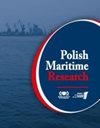Experimental Research of the Impact of Ship’s Rolling on the Performance of PV Panels
IF 2
3区 工程技术
Q2 ENGINEERING, MARINE
引用次数: 0
Abstract
Abstract The aim of the International Maritime Organization (IMO) to reduce by half the amount of greenhouse gases emitted by marine ships by 2050, and its vision of the fastest total decarbonisation in the maritime shipping industry within the present century, calls for implementation with various means of decarbonisation. The IMO approaches the process of decarbonisation in two phases. Firstly, short-term, compact projects are to be considered, next, more complex, medium- and long-term solutions should be aimed at. The preferred arrangements to be applied are photovoltaic systems. Their performance depends to a high degree on the solar incidence angle. In the case of a ship swinging as a result of its course in relation to the wave and incidence direction, the incidence angle undergoes significant periodic changes with a significant effect on the power generated by the PV panels. As a result, the total amount of energy produced by the PV panels diminishes. The paper presents experimental research results obtained on the stand that allowed the investigation of PV panels in simulated marine conditions. Two characteristic positions of a PV panel’s rotation axis in relation to the solar rays’ incidence direction were investigated. It was proved for both variants that the rolling period and solar incidence angle affected the power generated by the PV panel.船舶横摇对光伏板性能影响的实验研究
摘要国际海事组织(IMO)到2050年将船舶温室气体排放量减少一半的目标,以及其在本世纪内实现海运业最快全面脱碳的愿景,要求采用各种脱碳手段。国际海事组织将脱碳进程分为两个阶段。首先,应考虑短期、紧凑的项目,其次,应针对更复杂的中长期解决方案。首选的安排是光伏系统。它们的性能在很大程度上取决于太阳的入射角。在船舶因其相对于波浪和入射方向的航向而摆动的情况下,入射角会发生显著的周期性变化,对光伏电池板产生的功率产生显著影响。因此,光伏电池板产生的总能量减少。本文介绍了在模拟海洋条件下对光伏电池板进行研究的试验研究结果。研究了光伏电池板旋转轴相对于太阳光线入射方向的两个特征位置。事实证明,对于这两种变体,滚动周期和太阳入射角都会影响光伏电池板产生的功率。
本文章由计算机程序翻译,如有差异,请以英文原文为准。
求助全文
约1分钟内获得全文
求助全文
来源期刊

Polish Maritime Research
工程技术-工程:海洋
CiteScore
3.70
自引率
45.00%
发文量
20
审稿时长
>12 weeks
期刊介绍:
The scope of the journal covers selected issues related to all phases of product lifecycle and corresponding technologies for offshore floating and fixed structures and their components.
All researchers are invited to submit their original papers for peer review and publications related to methods of the design; production and manufacturing; maintenance and operational processes of such technical items as:
all types of vessels and their equipment,
fixed and floating offshore units and their components,
autonomous underwater vehicle (AUV) and remotely operated vehicle (ROV).
We welcome submissions from these fields in the following technical topics:
ship hydrodynamics: buoyancy and stability; ship resistance and propulsion, etc.,
structural integrity of ship and offshore unit structures: materials; welding; fatigue and fracture, etc.,
marine equipment: ship and offshore unit power plants: overboarding equipment; etc.
 求助内容:
求助内容: 应助结果提醒方式:
应助结果提醒方式:


